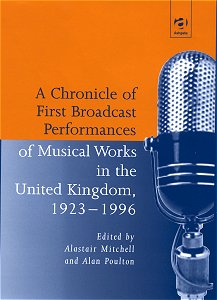It sounds and looks an intimidating prospect but is actually
a fascinating documented chronological list of first performances broadcast
by the BBC. It does not, however, include gramophone records or CDs
of such music, and this is an important distinction. It is sourced from
the Programme-as-Broadcast logs kept at the BBC Written Archives at
Caversham, near Reading. The information given consists of the date
of the broadcast, the composer, the title of the work, performers and
conductor. They are confined to the BBC nationwide and therefore exclude
local and commercial broadcasting stations, and with 800 pages in this
weighty tome, it's just as well. Some worthy examples include the first
UK performance (UKFP) from the Savoy Hotel of Gershwin's Rhapsody
in Blue (15 June 1925), the first broadcast performance (FBP) of
Vaughan William' Benedicite (Queen's Hall 28 July 1931), Bliss's
television opera Tobias and the Angel (19 May 1960) and Britten's
Paul Bunyan (1 February 1976) with his Night Mail music
for the Post Office film another notable first (16 October 1949). Other
early transmissions include Messiah (December 1924). The programme
style devoted to the works of a single composer also began surprisingly
early in the history of broadcasting, such as music by Saint Saëns
(27 June 1923) only two years after his death, and by Sir Alexander
Mackenzie in October of the same year. Another gem was the first UK
performance of Rachmaninov's fourth piano concerto (Lev Pouishnoff as
soloist, the conductor, Wood) from Manchester on 2 December 1928.
To underscore the great advances in broadcasting technology which occurred during the second half of the twentieth century, the first eighth of the book deals with the period to the end of the second World War, whilst the rest covers the 50 years thereafter. In this fascinating early period Elgar features much, and there are bizarre juxtapositions such as the FBP of Varèse's orchestral work Hyperprism under Goossens with the Wireless Orchestra (30 July 1924) followed two days later by another FBP, this time arrangements for brass band of Mendelssohn's overture Ruy Blas and bits of Elijah played by St Hilda's Colliery Band. The various names of the performers often have a bizarre ring to them, such as the 2ZY Opera Chorus and Augmented Orchestra, the 2BD Choir, and the Savoy Orpheans' Augmented Symphonic Orchestra and Savoy Havana Band (the last-named it was who broadcast Gershwin's Rhapsody mentioned above). In amongst the pioneering days is Arthur Wood's orchestral suite My Native Heath, whose final fourth movement is Barwick Green, now familiar to one and all as the signature tune to The Archers. Amazing to realise that Eric Fogg's Ode to a Nightingale for baritone and harp to words by Keats, and given a first London performance 75 years ago on 21 June 1926, was sung by Dale Smith and (more significantly) accompanied by Sidonie Goossens, still with us today as she approaches her 102nd birthday on the 19th of this month.
It's so tempting to dwell on these early days and particularly when the likes of Elgar, Lambert, Ireland, Bantock, Benjamin, Jacob, Berkeley, Bartok, Prokofiev and Schoenberg are either conducting or playing their own compositions. While all but the first three of Havergal Brian's 32 symphonies were broadcast over the quarter century from 1954 to 1979, the lion's share goes to Britten, whose music alone takes up four pages of the index. Even Mozart features, though my understanding of K.456 is that it is a piano concerto in Bb and not a symphony, as listed as conducted by Mosco Carner on 16 November 1942 (no orchestra or soloist mentioned). Neither is there any mention of the Schwiller Quartet's first UK broadcast performance of Max Bruch's late String Quartets (A minor and Eb) and the String Octet, which to the best of my knowledge was transmitted on 6 October 1937.
Priced at £75, it is probably destined for the shelf of a public library, and regrettably only the major ones these days, but it is nevertheless a fascinating book to dip into, especially if you might be looking for ideas for concert programming. There are barely three pages of narrative, but the rest makes compulsive exploration. It joins the many excellent books on broadcasting in music, going back to Roger Eckersley's BBC and All That (1946), through Nicholas Kenyon's History of the BBC Symphony Orchestra (1981) to Humphrey Carpenter's excellent history of the BBC Third Programme and Radio 3, The Envy of the World (1996) and Jennifer Doctor's The BBC and Ultra-Modern Music 1922-1936, shaping a nations' tastes.
Christopher Fifield

